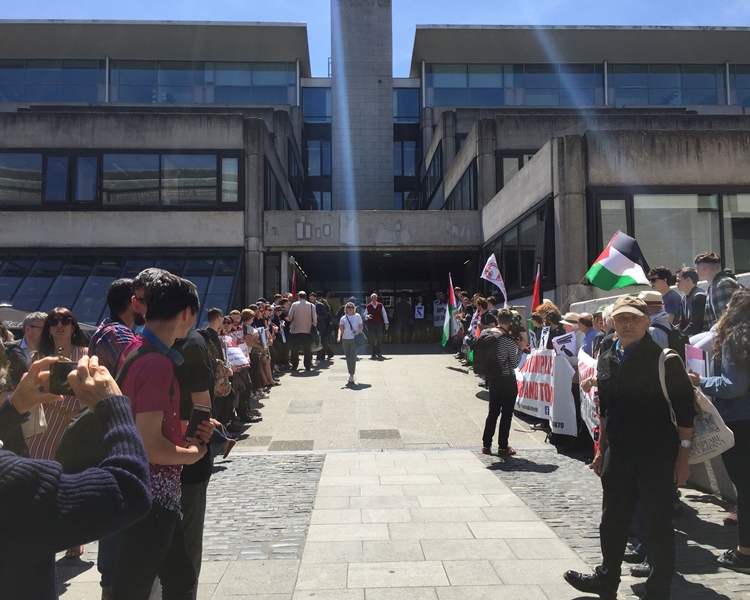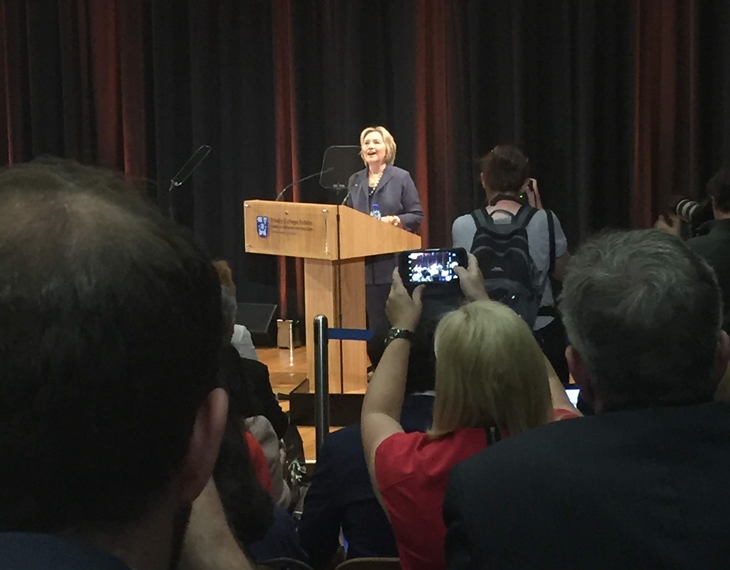“Let’s get to work” | Hillary Clinton’s Trinity College address
At the end of a week that saw RTÉ air its acclaimed documentary No Country For Women, while news of the dearth of women at the MacGill summer school flooded the internet, Hillary Rodham Clinton’s Trinity College, Dublin address offered a surprising reprise, elevating the importance of the voices, stories and experiences of women.
Two hours before the talk was due to start, campus security kept a firm handle on the venue. There were swarms of people in the vicinity of the Arts Block and Front Square, but no signs yet of the promised protestors. Most appeared to be tourists, somewhat unaware as to what was going on.
Access to the Arts Block was restricted, with access granted only to students and those attending the event itself. Various members of the media and waiting audience sat outside with coffees. It was sunny, they were fine. People wanting the bathroom were politely, but firmly redirected towards the Berkeley library. In conversation with Trinity security guards leading up to the event on Friday, 22nd June, they were apprehensive, alert to potential trouble and wary of anyone asking questions.
“You’re not one of those protestors, looking for ways to get in are you?”, one tentatively asked me.
Assuring him I wasn’t, he told me they hadn’t yet been briefed, but expected it to be incredibly strict.
At midday, a number of groups gathered outside the Arts Block to protest, consisting of members from such organisations as People Before Profit, Irishantiwar.org and Students for Justice in Palestine. Lining the entrance of the building, they chanted ‘Who’s campus? Our campus’, ‘Clinton, Clinton, Clinton. Out! Out! Out!’
The theatre filled much quicker than anybody anticipated, while Clinton’s mere intriduction by Dean of Research, Linda Doyle immediately had the crowd up for a standing ovation. Quite a few spectators couldn’t hold back their tears, so overcome were they by the reaction and her spectacle.

The talk itself wrestled with the forces of left and right wing politics, and the role of the youth in ensuring a better future. Her address began with acknowledging what had changed since she last came to Ireland, including becoming a grandmother, a presidential candidate and writing a book. It was this book, What Happened.
Her book became the springboard for delving into the focus of her address. Although reflecting on the past in her latest work, Clinton said she was also reaching for the future, and what it means to stand up for facts and rational debate as was the standard of her presidential opponent.
[perfectpullquote align=”right” bordertop=”false” cite=”” link=”” color=”#8D3AF9″ class=”” size=””]”You’re not one of those protestors, looking for ways to get in are you?”[/perfectpullquote]
Conceding that we are living in “tumultuous times”, the burden of the future was placed on the younger generation. If Clinton painted a bleak picture of the future for the youth, she was just as quick to assure them that they were capable of brightening that themselves. For every cloud, Clinton raised a silver lining. We are at a “global tipping point” when it comes to democracy, but the youth would be the ones that will save us. She pointed to our own “electoral success” in the form of the marriage and abortion referendums, but emphasised that now was not the time to be complacent, knowing that we couldn’t assume anything. Applause erupted from the audience, but Clinton rolled on like the polished orator that she is.
For every threat to democracy by Putin, for every crisis of parents and children separated at borders, a wave of “moral conviction, and civic engagement” rose to meet it. Here, Clinton extended what felt like a plea: “It will fall to you and to your peers”, she said urging the audience to see openness and diversity as sources of strength and unity rather than division.
She addressed doubts younger generations have with politics, the apathetic nature that is clear when we ourselves look at the low rates of students engaged in campus politics in Dublin alone. She pointed to the teenage activists in America, embroiled in a rhetorical war with the NRA, a body most politicians were hesitant to aggravate.
Clinton herself has been open with her struggles of not being a “natural politician.” Charisma and public speaking did not come as easily to her as did passion, and knowledge. Of course, this didn’t prove to be a problem as she spoke uninterrupted about issues that she felt strongly about; the youth, potential for change, the Trump administration, as well as reminiscing on fond memories of Ireland.
Although an effective, eloquent speaker, the address seemed tinged with a silent sadness. Whereas in 2016, Clinton sold herself on an ability to bring change from within the White House, with the help and votes of the American people, she now spoke solely of the youth as being able to “build a world better than the one the older generation are leaving in their lap.”
In the aftermath of the Trump presidency, Clinton moved from a key player on the team to a cheerleader occupying the sidelines. She is marred by a slight sense of resignation, having done all that she could. Now it’s up to us.
Passing the baton on to the students and graduates of “this great university and beyond”, the former Secretary of State urged young people to commit to the arduous, worthy work of building a great democracy and becoming candidates or representatives for change, whether that be in the political sphere or elsewhere.
Her ultimate call to the youth was encapsulated in her final sentence, borrowing Samuel Beckett’s well versed quote, “Ever tried. Ever failed. No matter. Try again. Fail again. Fail better”, signing off with that most Clintonian of statements: “Let’s get to work.”
If she was ‘Secretary Clinton’ for the first part of her address, when talking to President Robinson, she slipped into being just Hillary, not quite a friend, but a public face who we felt we’d come to know.
[perfectpullquote align=”right” bordertop=”false” cite=”” link=”” color=”#8D3AF9″ class=”” size=”18″]The former Secretary of State urged young people to commit to the arduous, worthy work of building a great democracy and becoming candidates or representatives for change.[/perfectpullquote]
Robinson’s first question asked of her resilience, something Clinton demonstrated simply by being here and further proving it with her ability to poke fun at herself and at what was possibly the greatest loss in American political history. This resilience, she said, emanated from learning of her own mother’s struggles and strengths as a child, and emphasised the necessity of kindness, and the long lasting impact that it can have on people.
The mood lightened somewhat when Robinson digressed from policy, asking instead for funny stories from the White House. Clinton reminisced on motherly duties being misunderstood, and not meaning to alert the Secret Service of her late night need for eggs, bread and apple sauce for an ill Chelsea Clinton.
The women’s familiarity is evident; with Robinson prodding Clinton to talk about stories they both knew. At one point Clinton failed twice to recall the specific memory Robinson had been alluding to, with Robinson eventually regaling the story. Clinton picked up the tail-end of the story, “as Mary said…’
Their history was irrefutable, their friendship based on mutual respect, and shared stories and they paid homage to their mutual friend and activist Inez McCormack.
Given the security measures implemented, and the fact that those involved in asking questions were pre-selected, there was little room for conflict, with questions remaining well within the sphere of Clinton’s comfort zone; advice for future female leaders, diversity in colleges, and how to encourage women to run for office.
The given advice seemed to take on particular resonance coming from Secretary Clinton, given her long career path and the public nature of it. “Go in with your eyes open,” she said, and warned of the “ubiquitous but diminishing” double standard for women. “Be a strong advocate for yourself.”

Clinton, in words that felt close to the bone, advised women that no-one is perfect, to know their own worth, and in an afterthought said to help women, because “it’s good for everyone.”
In what could have been an overarching pessimistic talk filled with warnings of the rise of right wing populism in both Europe and the United States, Secretary Clinton managed to present the arguments; that the world is a tumultuous place at the moment, that we are living in an era of humanitarian crisis, yet her conclusions ensured those listeners were feeling positive and thoroughly motivated.
Her delivery isn’t marred by despondency. Instead, she revels in her almost unwavering faith in the youth of today, what they will do better, what they have done so far and how they are transforming into “unlikely activists.”
She’s a seasoned warrior, appearing to have already overcome the scars of 2016 and the audience was thrilled by her self-deprecating jokes about having lost the presidency, “hadn’t we heard?”
There weren’t many surprises in the address, save for Clinton herself. She was witty, self-aware and willing to make jabs at herself. Not only that, she still clings to a profound sense of optimism, embodying the mantra: “nevertheless she persisted.” The struggle to ensure that women are fully equal will be marred by metaphorical and figurative losses. There will be more to come, but she stood there to remind the rapt audience that progress is imminent.
